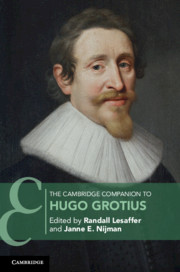Book contents
- The Cambridge Companion to Hugo Grotius
- Cambridge Companions to Law
- The Cambridge Companion to Hugo Grotius
- Copyright page
- Contents
- Contributors
- Preface
- Chronology
- Abbreviations and Short Titles of Works by Grotius
- Editions and Translations of Grotius’ Work
- Introduction
- Part I Grotius in Context
- Part II Concepts
- Part III Grotius as a Man of Letters, Theologian and Political Writer
- Part IV Grotius as a Legal Scholar
- 18 Legal Scholastic and Humanist Influences on Grotius
- 19 Grotius’ Introduction to Hollandic Jurisprudence
- 20 The Laws of War- and Peace-Making
- 21 The Law of Armed Conflict
- 22 The Freedom of the Seas
- 23 Property
- 24 The Law of Contract and Treaties
- 25 Punishment and Crime
- Part V The Reception of Grotius
- Index
- References
22 - The Freedom of the Seas
from Part IV - Grotius as a Legal Scholar
Published online by Cambridge University Press: 03 September 2021
- The Cambridge Companion to Hugo Grotius
- Cambridge Companions to Law
- The Cambridge Companion to Hugo Grotius
- Copyright page
- Contents
- Contributors
- Preface
- Chronology
- Abbreviations and Short Titles of Works by Grotius
- Editions and Translations of Grotius’ Work
- Introduction
- Part I Grotius in Context
- Part II Concepts
- Part III Grotius as a Man of Letters, Theologian and Political Writer
- Part IV Grotius as a Legal Scholar
- 18 Legal Scholastic and Humanist Influences on Grotius
- 19 Grotius’ Introduction to Hollandic Jurisprudence
- 20 The Laws of War- and Peace-Making
- 21 The Law of Armed Conflict
- 22 The Freedom of the Seas
- 23 Property
- 24 The Law of Contract and Treaties
- 25 Punishment and Crime
- Part V The Reception of Grotius
- Index
- References
Summary
The laws of war, as expounded by Grotius, resulted from an interplay of natural law and the voluntary law (or law of nations), which was a customary law based on state practice.Important ways in which the voluntary law departed from natural law were in according equal rights to belligerents in war, without regard to the justices of the respective causes.The predominant principle governing the conduct of war was necessity, which had both a permissive and a restrictive character.Grotius was a firm supporter of moderation in the exercise of the rights of belligerency.This worked particularly to the benefit of civilians and prisoners of war.He insisted that principles of good faith must operate in war, so that perfidious acts were prohibited, though ordinary ruses of war were allowed.The voluntary law, to Grotius, allowed the unlimited taking of property belonging to enemy nationals.Grotius also gave careful attention to modern concerns such as targeted killing.An important contributions was to lay the groundwork for the law of neutrality, setting out rules on the treatment of neutral-owned property in war and on the treatment of enemy-owned property in the custody of neutrals.
- Type
- Chapter
- Information
- The Cambridge Companion to Hugo Grotius , pp. 477 - 491Publisher: Cambridge University PressPrint publication year: 2021

